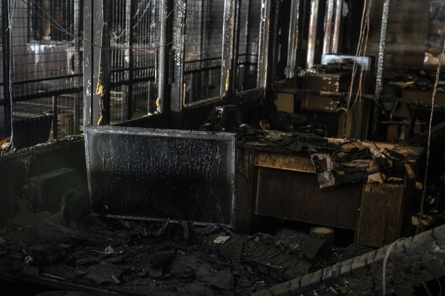Commercial fire damage can be devastating, resulting in significant financial losses, interruption of business operations, and even loss of life. As we observe Fire Prevention Month this October, it's a timely reminder that prevention is always better than cure when it comes to fire safety.
Our team at ServiceMaster by Fuson - Traverse City has compiled five critical safety tips to help prevent commercial fires and reduce the effects of property damage.
1. Regular Fire Risk Assessments
Regular fire risk assessments are one of the most effective preventative measures against commercial fire and smoke damage. This process involves identifying potential fire hazards within your premises, evaluating who could be at risk, and implementing measures to mitigate these risks.
For instance, an assessment might reveal that certain areas are prone to overheating or that there's a high concentration of combustible materials in a particular location. By identifying these risks early, you can take appropriate actions to minimize them, such as improving ventilation or rearranging storage areas.
2. Proper Storage of Flammable Materials
The improper storage of flammable materials is a common cause of commercial fires. This includes substances like:
- Cleaning products
- Paints
- Oils
- Paper
- Cardboard
These materials should be stored in a safe and controlled environment, away from ignition sources.
Storage areas should be well-ventilated and equipped with appropriate fire safety measures, such as fire-resistant doors and automatic fire suppression systems. Additionally, all staff should be trained in safe material handling procedures.
3. Fire Safety Equipment
Fire safety equipment is crucial in preventing and controlling fires at your commercial property. This equipment, which includes fire extinguishers, fire alarms, and sprinkler systems, can save lives, prevent injuries, and minimize property damage in the event of a fire.
Fire Extinguishers
Fire extinguishers are essential for controlling small, contained fires. They should be strategically placed in areas where fires are most likely to break out, such as kitchens or storage areas with flammable materials. Choosing the right type of fire extinguisher for the specific types of fire risks present on your property is crucial — for example, using a water-based extinguisher on an electrical fire can be dangerous.
Fire Alarms
Fire alarms provide early warning of a fire, giving people time to evacuate safely. They should be installed throughout the property, especially in hidden areas where a fire could go unnoticed, like basements or attics. It's also important to test your fire alarms regularly to ensure they're working correctly and to change batteries at least once a year.
Sprinkler Systems
Automatic sprinkler systems can control a fire until the fire department arrives; in some cases, they can even extinguish it entirely. They activate automatically when a certain heat level is detected, spraying water over the fire-affected area. Sprinkler systems should be inspected regularly to ensure all components are functioning properly.
Regular inspection and maintenance of these devices are key to their effectiveness. A fire extinguisher that doesn't work or a fire alarm that doesn't sound can lead to disastrous consequences. Arrange for regular professional inspections and perform routine checks yourself to verify that all equipment is in good working order.
Remember, fire safety equipment is your first line of defense against a fire. Ensuring it's correctly installed and maintained can distinguish between a minor incident and a major disaster.
4. Clear Escape Routes
In the event of a fire, clear and accessible escape routes are crucial for safe evacuation. These pathways should be free of obstacles and clearly marked with signs. Additionally, they should be well-lit, especially during power outages, to facilitate quick and safe evacuation.
Regular inspections can help ensure that these routes remain unobstructed and visible at all times. It's also advisable to have alternative escape routes if the primary route is blocked by fire or smoke.
Our restoration professionals can help you develop an effective evacuation plan with our commercial pre-loss planning services.
5. Staff Training
Regardless of how many fire prevention measures you implement, they won't be as effective without proper staff training.
All employees should know what to do in the event of a fire, including:
- How to use firefighting equipment
- How to evacuate the building
- Where to assemble outside
Regular fire drills can help reinforce this training and ensure everyone knows their role during an emergency. Panic can be as dangerous as a fire, so adequate training can help maintain calm and order during a crisis.
Preventing commercial fire damage involves a combination of various safety measures and a bit of awareness. Still, if you’re currently experiencing the effects of a natural or human-made fire, ServiceMaster by Fuson - Traverse City is here to offer support and comprehensive solutions. As we mark Fire Prevention Month, commit to ensuring your commercial space is safe from devastating property damage.
Contact us today to get started!


